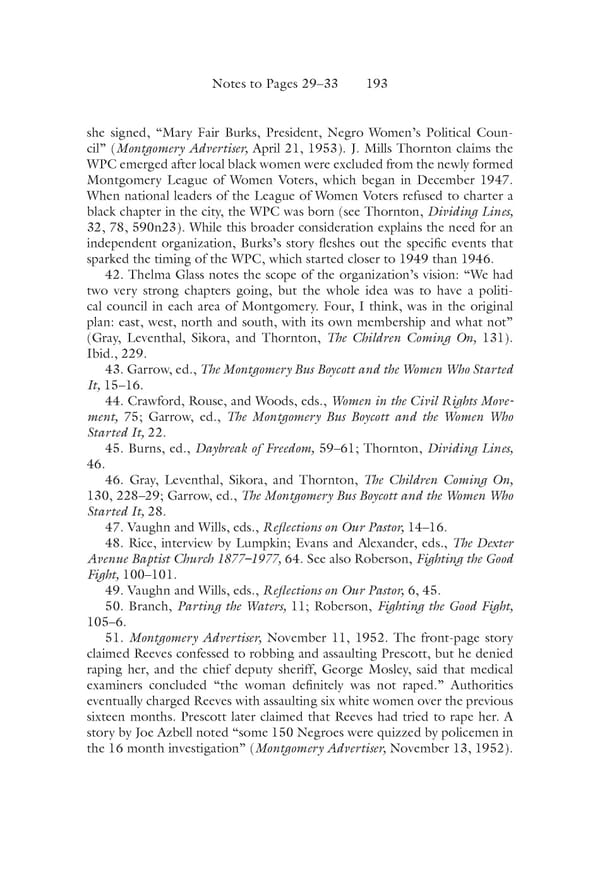Notes to Pages 29–33 193 she signed, “Mary Fair Burks, President, Negro Women’s Political Coun- cil” (Montgomery Advertiser, April 21, 1953). J. Mills Thornton claims the WPC emerged after local black women were excluded from the newly formed Montgomery League of Women Voters, which began in December 1947. When national leaders of the League of Women Voters refused to charter a black chapter in the city, the WPC was born (see Thornton, Dividing Lines, 32, 78, 590n23). While this broader consideration explains the need for an independent organization, Burks’s story fleshes out the specific events that sparked the timing of the WPC, which started closer to 1949 than 1946. 42. Thelma Glass notes the scope of the organization’s vision: “We had two very strong chapters going, but the whole idea was to have a politi- cal council in each area of Montgomery. Four, I think, was in the original plan: east, west, north and south, with its own membership and what not” (Gray, Leventhal, Sikora, and Thornton, The Children Coming On, 131). Ibid., 229. 43. Garrow, ed., The Montgomery Bus Boycott and the Women Who Started It, 15–16. 44. Crawford, Rouse, and Woods, eds., Women in the Civil Rights Move- ment, 75; Garrow, ed., The Montgomery Bus Boycott and the Women Who Started It, 22. 45. Burns, ed., Daybreak of Freedom, 59–61; Thornton, Dividing Lines, 46. 46. Gray, Leventhal, Sikora, and Thornton, The Children Coming On, 130, 228–29; Garrow, ed., The Montgomery Bus Boycott and the Women Who Started It, 28. 47. Vaughn and Wills, eds., Reflections on Our Pastor, 14–16. 48. Rice, interview by Lumpkin; Evans and Alexander, eds., The Dexter Avenue Baptist Church 1877–1977, 64. See also Roberson, Fighting the Good Fight, 100–101. 49. Vaughn and Wills, eds., Reflections on Our Pastor, 6, 45. 50. Branch, Parting the Waters, 11; Roberson, Fighting the Good Fight, 105–6. 51. Montgomery Advertiser, November 11, 1952. The front-page story claimed Reeves confessed to robbing and assaulting Prescott, but he denied raping her, and the chief deputy sheriff, George Mosley, said that medical examiners concluded “the woman definitely was not raped.” Authorities eventually charged Reeves with assaulting six white women over the previous sixteen months. Prescott later claimed that Reeves had tried to rape her. A story by Joe Azbell noted “some 150 Negroes were quizzed by policemen in the 16 month investigation” (Montgomery Advertiser, November 13, 1952).
 Becoming King: Martin Luther King Jr. Page 213 Page 215
Becoming King: Martin Luther King Jr. Page 213 Page 215